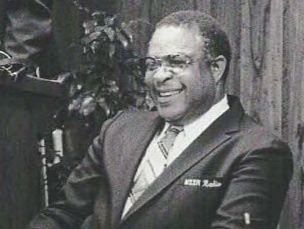Leighton native Robert “Bob” Carl Bailey has been inducted into the Alabama Broadcasters Association Hall of Fame on Thursday, August 8th 2024. But being a broadcaster was only one part of a rich life spent serving his community in many capacities before his death in 2001.
From the ABA:
Bailey was the first African American to own a radio station in Northwest Alabama and the first to operate a Black formatted radio station in the Florence-Muscle Shoals area.
His broadcasting career, coupled with everything he did to help the Black community through government involvement, social work and out of the goodness of his heart has earned Bob Carl Bailey an induction into the Alabama Broadcasters Association Hall of Fame.
“My father could do anything,” says his daughter Tori Bailey. “He had an engineer’s license and I used to call him MacGyver because he could take a paper clip and some gum and make pretty much anything work!”
Bailey found solutions beyond the engineering variety.
“There are people who tell me these stories about how he made a difference in their lives. He would hear about a problem and then he would resolve it,” says Tori. “For instance, there were some attorneys who came here – a small shop – and they didn’t have a lot of resources. So, Dad paid for their secretary’s salary for an entire year, just so their business could make it.”
“He bought a truckload of coal, and had it delivered to a gentleman who lived out in a very insubstantial house. He didn’t ask what was needed. He saw a need and fulfilled it.”
Bailey was one of the first African American music retailers. He owned three record stores with his wife, Odessa. “He was the first African American to serve on an Alabama governor’s cabinet because he asked, ‘What are you doing for small businesses? Small businesses collectively employ more people than these major corporations that you’re courting.’ The governor agreed and Dad began to go all over the state asking, ‘what do you need?’”
“Bob Carl introduced Jimmy Hughes to Rick Hall,” says Brian Corrigan, a Music Preservation Consultant with the Muscle Shoals National Heritage Area (MSNHA). “And that yielded ‘Steal Away’, one of Rick Hall’s first big hits as a producer and sort of put Muscle Shoals on the map.”
Through MSNHA, Corrigan is working to get Bailey’s WZZA a National Heritage Site designation. His research has made him somewhat of a Bob Carl Bailey aficionado.
“When James Brown was in town for a concert and discovered there were no black radio stations,” continues Corrigan, “he suggested to Bob Carl that he should open his own station. It took him six or seven years from that point to get from first being hired as a manager at WZZA to then eventually becoming part owner.”
Speaking of recognition, it was earlier this year that Bailey was honored in Leighton with a historical marker, changing First Street to Bob Carl Bailey Memorial Drive.
“My dad had another kid,” smiles Tori. “This kid was this radio station. He spent so much time here, and it mattered so much to him. I think he would be proud of the fact that it’s still here, still servicing the public that didn’t have that voice before this radio station came to be.”
“And he used the radio as a forum to do that, to bring attention to these challenges that were faced by people that maybe would otherwise go overlooked, unaddressed. And so he was an advocate, and the radio station helped him to advocate for the people in the Shoals area and beyond.”
“I’m so hoping that we continue that legacy, that we continue to do that, that we see what needs doing, and we do it. We see a need and we fill it. And I’m hoping that we can do just half of the things that he did during his time that he walked this earth.”
“I think he would be very proud to know that there are people who remember his contributions, what he did, who he was.”


